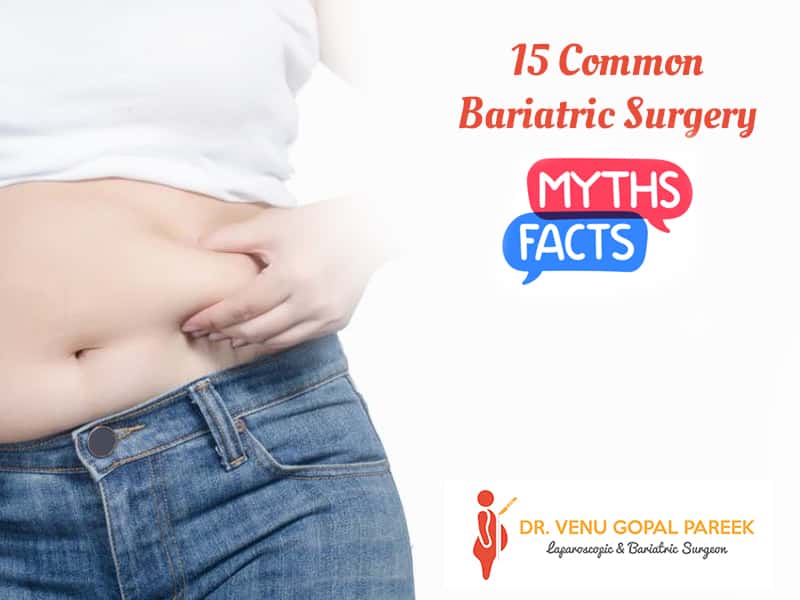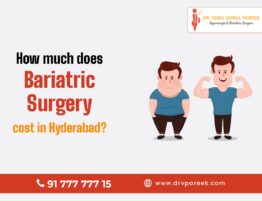
Obesity has a high prevalence in India, with changing lifestyles and India is known as the third largest obese country in the world. Many physiological and psychological factors contribute to obesity, but it is often misunderstood. No two people have the same metabolism and body type, hence the same procedure may not work for everyone.
Obesity is often considered to be a condition related to body weight. However, further research has shown that it affects many other organs in the body and can endanger general health and well-being.
Bariatric surgery is a weight-loss operation that gives patients a new life. But as with any surgery, some misconceptions make people hesitate to talk to their doctors about this treatment method.
There are many types of bariatric surgery, but the gastric bypass is perhaps the most famous. Dr Venu Gopal Pareek, an experienced bariatric surgeon and weight loss surgery specialist, has helped many patients in his practice in Hyderabad, by performing bariatric surgery.
When thinking about weight loss surgery, you must know the facts – and myths – of this weight loss approach. Following are some of the most common myths about bariatric surgery.
Myth: Anyone who wants to lose weight can get surgery.

Fact: Doctors, hospitals and surgical centres have rules about who has the right to undergo surgery. Usually approved for:
- Adults with a Body Mass Index (BMI) greater than 35 who have not responded to diet, exercise, or weight loss drugs.
- Adults with a BMI of over 32.5 who have serious health problems related to obesity, such as diabetes, coronary artery disease, or severe sleep apnea. If a patient having lifestyle changes and medications do not decrease health problems.
- Adults with a BMI over 30 who suffer from certain diseases such as diabetes and prediabetes or a combination of diseases such as high blood pressure, sleep apnea, high cholesterol and diabetes (also known as “metabolic syndrome”).
Myth: Bariatric surgery is only for unhealthy, overweight people.
Fact: Obesity is just one of the criteria that qualify a patient for surgery. Obese patients can also be candidates if they have one or more health problems such as diabetes, sleep apnea, high blood pressure, arthritis and high cholesterol, which can be reduced by weight loss.
Myth: Most people lose about 100 pounds after surgery.
Fact: The rate of weight loss varies from person to person and depends on the type of surgery. You can expect to lose at least 60% or more of your excess weight, but that also depends on how well you are on a diet and how much you exercise after surgery.
Myth: After surgery, you can continue eating as usual.
Fact: If you consume high-calorie drinks and snacks and don’t exercise, you will not see the results you expect. You must do your part by eating nutritious snacks, avoiding unhealthy snacks, and exercising regularly.
Myth: After bariatric surgery, you can’t eat anything that tastes good anymore.

Fact: Patients who undergo bariatric surgery may need to avoid lots of sweet foods because this can cause side effects such as dizziness and nausea. Patients with duodenal changes usually have to keep fatty foods to a minimum. However, many patients can also eat their favourite food after recovering from surgery. They only eat tiny portions. Even if you can’t eat what you like, you might find that weight-loss surgery is the perfect opportunity to experiment and find new foods to enjoy.
Myth: Liposuction and bariatric surgery are the same.
Fact: Liposuction is cosmetic contour surgery that helps shape the body, while bariatric surgery is a metabolic surgery that affects the body’s mechanism for weight loss.
Myth: Lack of vitamins and minerals is caused by bariatric surgery.
Fact: Bariatric nutritionists offer the right nutrition and supplements according to the surgery. If you follow that advice, there is no room for deficits.
Myth: Bariatric surgery is not worth the risk.
Fact: Several studies in large populations have shown that very obese patients undergoing bariatric surgery have a lower risk of dying compared to people with similar BMIs who have not had surgery. It means an increase in life expectancy of around 89%. Bariatric surgery is safer than most operations. Also, weight loss can increase or eliminate comorbidities, such as type 2 diabetes.
Myth: Older people should not undergo bariatric surgery because it is too dangerous.

Fact: Despite the risks associated with any operation, parents can undergo bariatric surgery as long as there are no major health problems which can later cause problems. It has been shown that bariatric surgery in patients aged 65 and over leads to significant weight loss, daily reduction in treatment and improvement in the quality of life. Talk to your doctor if you are over 65 and are considering bariatric surgery.
Myth: Most people gain more weight after surgery, so bariatric surgery is a waste procedure.
Fact: Bariatric surgery is the most effective solution for severe obesity. Studies show that more than 90% of people who undergo weight loss surgery lose half or more of their excess weight in the long run. If you follow the diet and exercise recommendations set by your doctor, your chances of successfully losing weight, in the long term are high. Take the first step today. Meet Dr Venu Gopal Pareek for advice.
Myth: Weight loss surgery involves the length of stay in the hospital.
Fact: Gastric sleeve or vertical sleeve gastrectomy (VSG) is the most common bariatric surgery in India. Gastric surgery usually takes about an hour, and patients often only spend one night in the hospital.
Myth: Patients with weight loss surgery must expect a long and painful recovery path.

Fact: Weight loss surgery is usually done laparoscopically, which means that only a few small incisions are made. The use of laparoscopic techniques can help patients recover faster with less postoperative pain than traditional surgery. Usually, patients do not need a catheter and only need a little pain relief. Most patients get up and walk 2 hours after surgery and can return to work or resume their routine activities in about a week.
Myth: The risk of weight loss surgery is greater than the health risks associated with obesity.
Fact: This dangerous myth is entirely untrue. While each operation has several risks, bariatric surgery is generally considered to be low risk. Bariatric Surgery for weight loss is less risky than common surgeries such as hip replacement or gallbladder removal. The health risks associated with obesity, including heart disease, type 2 diabetes, and high blood pressure, are among the most deadly diseases affecting Indians today. Weight loss surgery can reduce the risk of this disease.
Myth: Most patients with weight loss surgery regain lost weight.

Fact: Unlike traditional diets with high levels of failure rates, medical studies show that the majority of patients with bariatric surgery maintain weight loss seven years after surgery. Usually, patients who achieve optimal weight loss success are those who are fully committed to healthy habits such as regular exercise and careful food preparation. Dr Venu Gopal Pareek strives to be a lifelong partner for the health of his patients by providing ongoing support and motivation.
Myth: Weight-loss surgery is for people who are too lazy about diet and exercise, right?
Fact: No, and this dangerous myth prevents many people from seeking life-saving medical care. The human body has a complex and unique metabolic and hormonal system for regulating body weight, which means that the same diet and exercise that works for one person may not work for another person. Weight loss surgery patients have extensive experience, but they all require a lot of time and effort to lose weight. People usually don’t decide to undergo minor surgery. Dr Venu Gopal Pareek ensures that patients understand the commitment to healthy lifestyle changes they need to be successful throughout their lives.
Conclusion:
There are many myths that people believe in and avoid bariatric operations. The idea of bariatric surgery is to direct the patient to a healthier life and allow for proper weight loss. Removal of fat is not involved in bariatric surgery and it is only performed on the stomach.
Contact the most experienced weight loss surgeon, Dr Venu Gopal Pareek for more information about bariatric surgery and the various risks and benefits. You can reach Dr Venu Gopal Pareek at +91-91777-77715 and book your appointment.







